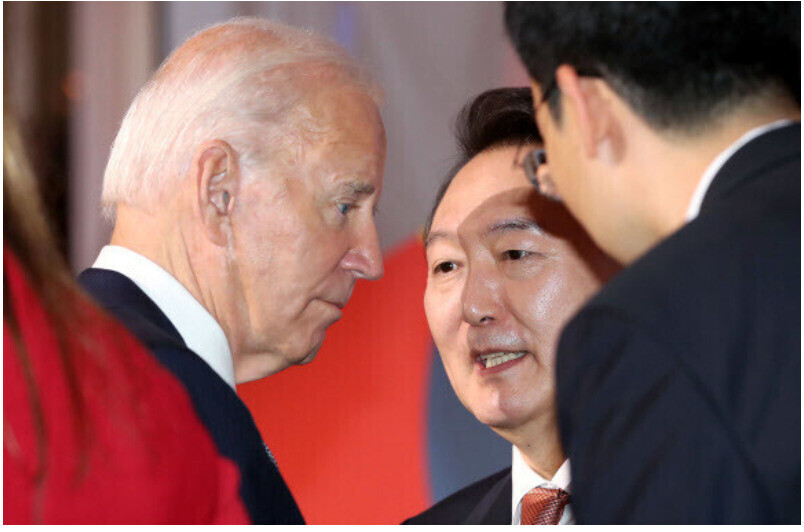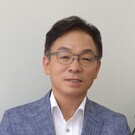hankyoreh
Links to other country sites 다른 나라 사이트 링크
[Column] Are S. Korean and US interests really 100% in sync?


Semiconductors, automobiles and rechargeable batteries — these are the present and future forces sustaining the South Korean economy.
But the future for these core industries has never looked as uncertain as it does these days. The problem is that we have no idea which direction the US will go.
Last year, the US presented follow-up measures for its CHIPS and Science Act and Inflation Reduction Act. Its aim is to keep China in check while restoring its own industry ecosystem.
A recently announced list of models eligible for electric vehicle (EV) tax credits consisted entirely of American-made vehicles, while Hyundai and Kia models were left out. Now we can only anxiously await the announcement of place-of-origin regulations on battery materials and the standards for semiconductor subsidy benefits.
The US has unquestionably changed. The magnanimity of the “world’s manager” and the guise of a “benign hegemon” have been cast aside. Now it is overtly employing industrial policies and restricting trade.
It is breaking down the very same rule-based free trade order that it spent nearly a century expanding after emerging as the world’s dominant power. While they may differ in all other respects, this is one area in which current President Joe Biden and his predecessor Donald Trump are aligned.
The US claims to be creating a new “value chain of trust” with its allies, but the standards are unclear. It certainly does not seem to be extending any generosity to its friends.
An example of this is the permission it granted Ford to build a battery factory in Michigan using the technology, equipment and workforce of China’s CATL, the world’s biggest battery company.
While the factory is said to be fully owned by Ford, this is really a roundabout means for a Chinese company to expand. Tesla is pursuing similar plans.
This is especially strange when we consider how the US has interfered with matters such as the proportions of Chinese battery materials used in other countries. Perhaps the reason is that the cheap lithium ferrophosphate batteries that China is so good at making are essential for hastening the widespread adoption of EVs in the US.
For the South Korean battery companies in heated competition with China, this inconsistent attitude from the US is a matter of concern. At the moment, the US is demanding that Samsung Electronics and SK Hynix fork over sensitive business secrets as a condition for providing semiconductor subsidies.
The shift in the US is disconcerting for those of us who learned from mainstream economics textbooks. The “common wisdom” that the US impressed on us is that it benefits everyone when protectionist barriers are removed and trade is expanded.
Financial Times columnist Martin Wolf noted that “the hostility to trade that has increasingly seized the US risks reversing nine decades of hugely successful policy.”
“These [rule-governed trading system] policies created a more prosperous world economy, which became the foundation of Western economic (and so political) success in the cold war. They facilitated a staggering reduction in global poverty,” he wrote.
Economist Ha-joon Chang insisted that the US has always been the sort of country that does whatever suits its national interests. In a recent interview with SisaIN, he said, “I’m only half joking when I say the US’ most important industry policy since WWII has been to insist, ‘We have no industrial policy.’”
Examples of this include the development of computers, semiconductors, touch screens, the internet, and more through budget investments for “defense research.” The US also tightened the screws on Japanese automobiles and semiconductors with its Plaza Accord and the two sides’ semiconductor agreement in 1986.
Once again, the US is a country hemmed in by its own narrow interests. Like it or not, this was predictable back when it was playing nice with its talk about principles and justifications. Now the world is watching nervously as it casts aside any concerns about appearances and runs amok.
Diplomatically, the Yoon Suk-yeol administration’s strategy seems to be to cling tightly to the US and hope for some kind of leniency.
It makes sense to remain on good terms with the US to respond to the North Korean nuclear threat and avoid prejudicial treatment of core industries. But it’s a different matter entirely when we do not even protest eavesdropping on the presidential office, and we opt instead to simply march to Washington’s tune. Fears of China and Russia growing distant from South Korea are rapidly being borne out.
In contrast with us, countries like France, Germany and the UK have been keeping themselves at arm’s length from the US-China conflict and working to manage their ties with Beijing. This is based on their practical determination that even in this neo-Cold War era, they can’t afford to go back to the sort of divisions that characterized the actual Cold War.
Over the past decades, a great deal of interdependency has taken root. Even US Treasury Secretary Janet Yellen said in an April 20 speech that the rivalry was restricted to areas such as security, while warning that “decoupling” from the Chinese economy would have “disastrous” consequences.
South Korea has grown through trade. What enabled us to achieve advanced economy status without getting stuck in the middle income trap is our trade environment and its dense network of connections centering on the US and China.
While we may follow the US’ lead in advanced areas related to national security, it would benefit us to adopt a strategy that does not lead to the collapse of our free and open trade environment. One option is to establish robust bonds of unity with other countries in a similar position.
The US and South Korea each have their own national interests. It is not reasonable to expect us to be “100% in sync.”
Please direct questions or comments to [english@hani.co.kr]

Editorial・opinion
![[Editorial] Penalties for airing allegations against Korea’s first lady endanger free press [Editorial] Penalties for airing allegations against Korea’s first lady endanger free press](https://flexible.img.hani.co.kr/flexible/normal/500/300/imgdb/original/2024/0502/1817146398095106.jpg) [Editorial] Penalties for airing allegations against Korea’s first lady endanger free press
[Editorial] Penalties for airing allegations against Korea’s first lady endanger free press![[Editorial] Yoon must halt procurement of SM-3 interceptor missiles [Editorial] Yoon must halt procurement of SM-3 interceptor missiles](https://flexible.img.hani.co.kr/flexible/normal/500/300/imgdb/child/2024/0501/17145495551605_1717145495195344.jpg) [Editorial] Yoon must halt procurement of SM-3 interceptor missiles
[Editorial] Yoon must halt procurement of SM-3 interceptor missiles- [Guest essay] Maybe Korea’s rapid population decline is an opportunity, not a crisis
- [Column] Can Yoon steer diplomacy with Russia, China back on track?
- [Column] Season 2 of special prosecutor probe may be coming to Korea soon
- [Column] Park Geun-hye déjà vu in Yoon Suk-yeol
- [Editorial] New weight of N. Korea’s nuclear threats makes dialogue all the more urgent
- [Guest essay] The real reason Korea’s new right wants to dub Rhee a founding father
- [Column] ‘Choson’: Is it time we start referring to N. Korea in its own terms?
- [Editorial] Japan’s rewriting of history with Korea has gone too far
Most viewed articles
- 1Months and months of overdue wages are pushing migrant workers in Korea into debt
- 2Trump asks why US would defend Korea, hints at hiking Seoul’s defense cost burden
- 31 in 3 S. Korean security experts support nuclear armament, CSIS finds
- 4[Editorial] Yoon must halt procurement of SM-3 interceptor missiles
- 5Fruitless Yoon-Lee summit inflames partisan tensions in Korea
- 6[Guest essay] Maybe Korea’s rapid population decline is an opportunity, not a crisis
- 7[Editorial] Penalties for airing allegations against Korea’s first lady endanger free press
- 8Bills for Itaewon crush inquiry, special counsel probe into Marine’s death pass National Assembly
- 9[Column] Can Yoon steer diplomacy with Russia, China back on track?
- 10At heart of West’s handwringing over Chinese ‘overcapacity,’ a battle to lead key future industries